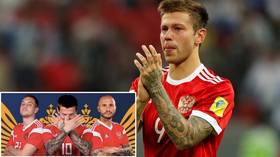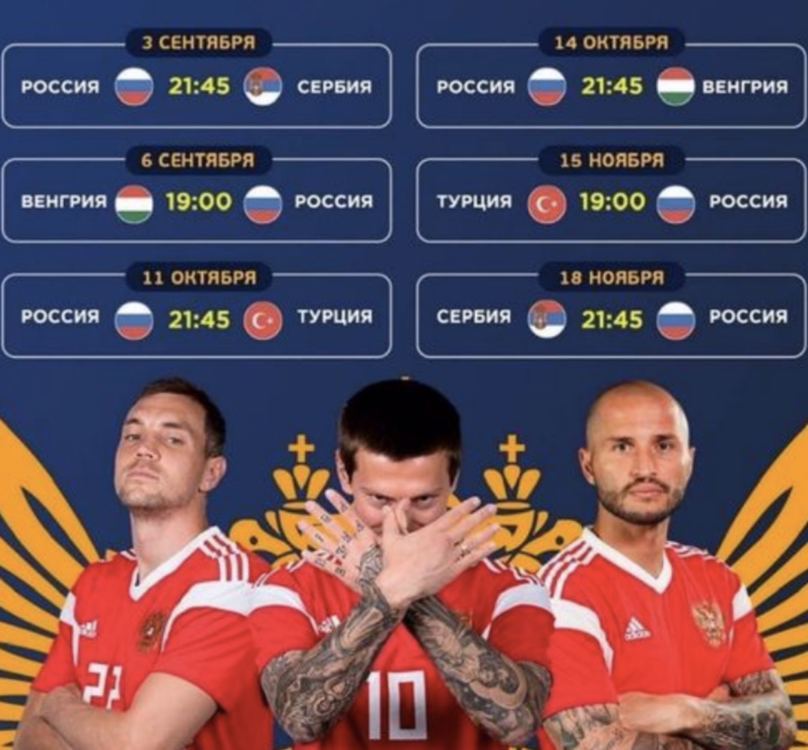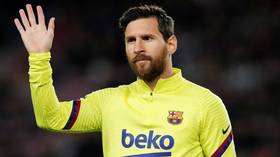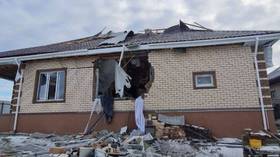‘Interpretation of the national emblem’: Euro 2020 account says the eagle gesture by a Russian player has no reference to Serbia

The official account of UEFA Euro 2020 in St. Petersburg was forced to clarify that its online banner featuring Russian players has no political background after internet users questioned the eagle gesture made by an athlete.
The UEFA Euro 2020 in St. Petersburg made a Twitter post containing Russia’s set of fixtures in the upcoming UEFA Nations League which will kick off on Wednesday.
Along with the full schedule of Russia’s matches, the publication also had a picture of three national players, with Fedor Smolov making a double-headed eagle salute with his hands.
The post, which was made on the verge of Russia’s encounter with Serbia, was deemed provocative by some users who saw political implications in Smolov’s gesture.

“Ahead of Russia’s game against Serbia a photo post emerges showing Fedor Smolov making an eagle with his hands. It’s all ok. BUT! This is a symbol of an Albanian eagle. This is a symbol of genocide for Serbia. God, who put this idea into Smolov’s head? And this happens ahead of the match against Serbia!” a user wrote.
Reacting to the controversial comments, many football fans noted that the photos which were used in the post were made before the 2018 World Cup in Russia and were officially approved by FIFA. Some users also said that the coat of arms of Russia depicts a golden two-headed eagle, which has no connection with Albania.
Перед матчем России - Сербия появляется рекламный коллаж, на котором Федор Смолов изображает ладонями орла. Все бы ничего. Но! Это символ АЛБАНСКОГО ОРЛА. Для сербов это символ геноцида в Косово. Боже, кто вложил в голову Смолова это? Да еще перед матчем с сербами! @A_Gasparyanpic.twitter.com/pFyHMrmDVb
— Андрей Малосолов (@AndreiMalosolov) September 3, 2020
“Are the Russians prohibited from showing a double-headed eagle which is a symbol of Byzantine heritage and Orthodox Christianity?” another person commented.
The UEFA Euro 2020 in St. Petersburg was quick to react, confirming that its post was not aimed at triggering controversy.
“Russian player’s gesture has no political representation. This was an expressive interpretation of the Russian coat of arms which was behind Fedor. We are sorry that the gesture was wrongly interpreted. We didn’t intend to offend anyone. This was our mistake,” the account said, deleting the controversial picture from its page.
Жест игрока сборной не имеет ничего общего с политической репрезентацией. Это экспрессивное выказывание на тему герба России, который находится у Федора за спиной. Нам жаль, что появилась такая искаженная интерпретация. Меньше всего мы хотели кого-то оскорбить. Это наша ошибка.
— ЕВРО-2020 в Санкт-Петербурге (@euro2020spb) September 3, 2020
The double-headed eagle is a symbol of the Albanian flag, and has a deeper connection with Albanian independence.
Kosovo, which is mostly populated by Albanians, seceded from Serbia in 2008 and was made a FIFA member in 2016. However, its independence remains a contentious political issue, as it has not been recognized by an array of countries, including Serbia and Russia.













